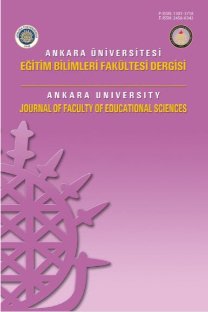Ethical Issues of ICT Use by Teacher Trainers: Use of E-books in Academic Settings
Öğretmen Eğitmenleri ve BİT Kullanımı Etik Konuları: Akademik Ortamlarda Elektronik Kitap Kullanımı
___
- Amiri, F. (2000). IT-literacy for language teachers: Should it include computer programming? System, 28(1), 77-84. doi:10.1016/S0346-251X(99)00061-5
- Chapelle, C. (2001). Computer applications in second language acquisition. Cambridge: Cambridge University Press.
- Chapelle, C. A., & Hegelheimer, V. (2004). The language teacher in the 21st century. In Fotos, S., Browne, C. (eds.), New perspectives on CALL for second language classrooms (pp. 299-316). Mahwah, NJ, London: Lawrence Erlbaum Associates.
- Compton, L. K. L. (2009). Preparing language teachers to teach language online: a look at skills, roles, and responsibilities. Computer-Assisted Language Learning, 22(1), 73-99. doi:10.1080/09588220802613831
- Estelle, L., & Woodward, H. (2010). Introduction: Digital information, an overview of the landscape. In H. Woodward & L. Estelle (Eds.), Digital information: Order or anarchy (pp. 1-33). London: Facet Publishing.
- Fitzpatrick, A., & Davies, G. (Eds.) (2003). The impact of information and communications technologies on the teaching of foreign languages and on the role of teachers of foreign languages: A report commissioned by the directorate general of education and culture. Retrieved from http://ec.europa.eu/education/policies/lang/doc/ict.pdf.
- Ganko-Karwowska, M. (2002). Kompetencje informatyczne nauczycieli szkól podstawowych. Paper presented at Informatyka w Szkole conference, Szczecin, 2002.
- Hampel, R., & Stickler, U. (2005). New skills for new classrooms: Training tutors to teach languages online. Computer Assisted Language Learning, 18(4), 311- 326.doi:10.1080/09588220500335455
- Hauck, M., & Stickler, U. (2006). What does it take to teach online? CALICO Journal, 23(3), 463-475.
- Hsu, J. L, & Chang, L. C.-Y. (2015). Unauthorized e-book downloading of students in higger Educational Studies. 41(3), 268-271. doi:10.1080/03055698.2014.984659
- Kılıçkaya, F. (2009). The effect of a computer-assisted language learning course on pre-service English teachers' practice teaching. Educaitonal Studies, 35(4), 437-448. 10.1080/03055690902876545
- Kılıçkaya, F. (2011). Improving pronunciation via accent reduction and text-to- speech software. In M. Levy., F. Blin, C. B. Siskin, O. Takeuchi (Eds.), WorldCALL: International Perspectives on Computer-Assisted Language Learning, (pp. 85-96). New York, NY: Routledge.
- Krajka, J. (2012). The Language teacher in the digital age: Towards a systematic approach to digital teacher development. Lublin: Wydawnictwo Uniwersytetu Marii Curie-Sklodowskiej.
- Kurek, M. (2009). Ksztaltowanie alfabetyzmu funkcjonalnego w jezyku obcym na poziomie szkól ponadsrednich za pomoca nauczania wspomaganego komputerem. Unpublished Ph.D. dissertation. Opole: Opole University.
- Landoni, M. (2011). E-books in digital libraries. In I. Iglezakis, T.-E. Synodinou & S. Kapidakis (Eds.), E-publishing and digital libraries: Legal and organizational issues (pp. 131-140). New York, NY: Information Science Reference.
- Misener, D. (2011, April). E-book piracy may have unexpected benefits for publishers. CBC News- Technology & Science. Retrieved from http://www.cbc.ca/news/technology/e-book-piracy-may-have-unexpected- benefits-for-publishers-1.1123710
- Turkish Law on Intellectual and Artistic works. (2008). Law No. 5846 of December 5, 1951 on Intellectual and Artistic Works (as last amended by Law No. 5728 of January 23, 2008). Retrieved from http://www.wipo.int/edocs/lexdocs/laws/en/tr/tr049en.pdf
- U.S. Copyright Office. (2014). Reproduction of copyrighted works by educators and librarians. Retrieved from http://www.copyright.gov/circs/circ21.pdf
- Wilczynska, W. (2005). Czego potrzeba do udanej komunikacji interkulturowej? In Mackiewicz, M. (ed.), Dydaktyka jezyków obcych a kompetencja kulturowa i komunikacja interkulturowa (pp. 15-26). Poznan: Wydawnictwo Wyzszej Szkoly Bankowej w Poznaniu.
- Wu, H.-C., Chou, C., Ke, H.-R., Wang, M.-H. (2011). College students' misunderstandings about copyright laws for digital library resources. The Electronic Library, 28(2), 197-209. doi: 10.1108/026404710110335766.
- Young, J. R. (2008, September). Students flock to web sites offering pirated textbooks. The Chronicle of Higher Education. Retrieved from http://chronicle.com/article/Many-Students-Seek-Pirated-/1129/
- ISSN: 1301-3718
- Yayın Aralığı: Yılda 3 Sayı
- Başlangıç: 1968
- Yayıncı: ANKARA ÜNİVERSİTESİ (EĞİTİM BİLİMLERİ FAKÜLTESİ)
Yeni müzebilim bağlamında müze eğitimine çağdaş yaklaşımlar ve müze eğitimcisi
Ceren KARADENİZ, Ayşe OKVURAN, Müge ARTAR, Ayşe ÇAKIR İLHAN
Ulaşım Sektöründe Kadın Emeği: Ankara'da Çalışan Kadın Sürücü Ve Makinistler
Birgül ULUTAŞ, Deniz SAPAZ, Derya DUMANLI
Türkçe Öğretmenliği Özyeterlik Algısı Ölçeğinin geliştirilmesi: güvenirlik ve geçerlik çalışması
Erdem ÇOCUK HALİL, Devrim ALICI, Özler ÇAKIR
Öğretmen eğitmenleri ve BİT kullanımı etik konuları: akademik ortamlarda elektronik kitap kullanımı
Ferit KILIÇKAYA, Jarosław KRAJKA
İşlemsel uzaklık algısı ve uzaktan eğitim uygulamalarına yansımaları
Reconsidering Brechtian elements in process drama
Geleceğin sanat eğitiminde göstergebilim yeri
Semiotics in the Future of Art Education
Eğitim ve Öğretimde Güncel Bir Yaklaşım: Teknoloji Destekli Esnek Öğrenme (Flipped Learning) Modeli
Ferhat KARDAŞ, Binnur YEŞİLYAPRAK
Ortaöğretim 9 ve 12. sınıf öğrencilerinin sürdürülebilir çevre bilinci düzeyleri
